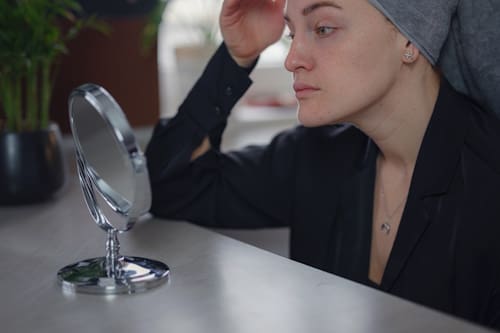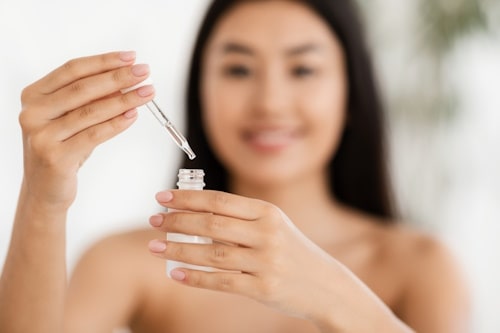Among the various approaches, hormonal therapies, specifically estrogen acne treatments, have garnered attention for their potential in managing acne, particularly in women.
This comprehensive guide dives into the nuances of estrogen acne treatments, exploring their efficacy, mechanisms, and suitability for different types of acne.
Also read: How to choose the best acne treatment
Biggest Take-Aways
- Hormonal treatments, especially those targeting estrogen levels, are effective for treating acne in women.
- Adult women are more susceptible to hormonal acne due to hormonal fluctuations.
- Natural remedies can complement acne treatments, but their effectiveness varies.
- Exposed Skin Care offers a balanced approach to treating various types of acne, combining natural and scientific ingredients for effective results.

What is Estrogen Acne Treatment?
Estrogen acne treatment refers to the use of estrogen-based hormonal therapies to treat acne, particularly in women. These treatments are designed to balance hormone levels, which can significantly impact the development and severity of acne.
Hormonal Acne: A Brief Overview
Hormonal acne may occur due to hormonal imbalances such as estrogen, progesterone, and androgens. This type of acne typically appears in areas like the jawline, chin, and cheeks and is common in adult women.
Causes of Hormonal Acne
- Hormonal Fluctuations: Common during menstrual cycles, pregnancy, menopause, and due to birth control usage.
- Excess Androgen Levels: Can lead to increased sebum production, clogging pores.
- Stress: Leads to hormonal changes, exacerbating acne.
How Does Estrogen Acne Treatment Work?
Estrogen acne treatments work by balancing hormone levels, particularly by reducing the effects of androgens. This balance can decrease sebum production, a key factor in acne development.
Mechanisms of Estrogen in Treating Acne
- Reducing Sebum Production: Estrogen helps in regulating sebum production in sebaceous glands.
- Anti-inflammatory Properties: Estrogen can reduce inflammation, a key factor in acne development.
- Regulating Skin Cell Growth: Helps in preventing pore clogging.

Types of Estrogen Acne Treatment
- Oral Contraceptives: Contain estrogen and progesterone, often used in treating hormonal acne in women.
- Topical Treatments: May include estrogen-containing creams or gels.
- Hormone Replacement Therapy (HRT): Used in specific cases, especially during menopause.
Evaluating the Effectiveness of Estrogen Treatments for Acne
Research indicates that estrogen treatments can be effective in treating acne, particularly hormonal acne in women. However, their suitability varies based on individual hormonal profiles and acne types.
Benefits of Estrogen Treatment for Acne
- Clear Acne in Women: Particularly effective in treating acne linked to hormonal imbalances.
- Reduced Inflammation: Helps in managing redness and swelling associated with acne.
- Prevent New Breakouts: By regulating hormones, they can prevent the recurrence of acne.
Limitations and Considerations
- Not Suitable for Everyone: Mainly effective for women with hormonal imbalances.
- Potential Side Effects: Can include nausea, weight gain, and mood changes.
- Long-term Usage: Requires careful consideration and regular monitoring.
Alternative Treatments for Hormonal Acne
While estrogen treatments are effective, there are other options available for managing hormonal acne.
Non-Hormonal Medications
- Isotretinoin: A potent treatment for severe acne.
- Antibiotics: Used to control inflammation and bacterial growth.
- Topical Retinoids: Help in unclogging pores and renewing skin cells.

Natural Remedies
- Tea Tree Oil: Known for its antibacterial properties.
- Green Tea Extract: Anti-inflammatory and reduces sebum production.
- Dietary Changes: Reducing dairy and high-glycemic foods can help.
Lifestyle Adjustments
- Stress Management: Yoga, meditation, and exercise can reduce stress-induced acne.
- Skincare Routine: Using non-comedogenic products and gentle cleansers.
- Avoiding Triggers: Identifying and avoiding acne triggers, like certain foods or products.
Benefits of Using Exposed Skin Care for Acne Management
Exposed Skin Care offers a comprehensive approach to acne management, targeting various factors that cause acne. Its effectiveness lies in its unique blend of scientific and natural ingredients, making it a preferred choice for those struggling with acne vulgaris and other related skin conditions.
Here are some benefits of Exposed Skin Care:
- Targeted Treatment for Cystic Acne: The products are formulated to penetrate deeply into the skin, reaching the hair follicles where cystic acne forms. This helps in reducing the size and severity of cysts and nodules.
- Prevention of New Acne Formation: Regular use can help prevent the formation of new acne, including blackheads, whiteheads, and pimples. This is achieved by carefully regulating sebum production and keeping pores clear.
- Natural and Scientific Ingredients: The products include natural ingredients like tea tree oil and aloe vera, combined with scientific components such as salicylic acid and benzoyl peroxide, to effectively treat and prevent acne.
- Reduces Acne Scars and Inflammation: Regular use may help reduce the appearance of acne scars and soothe skin inflammation.
- Safe for Various Skin Types: Formulated to be non-comedogenic and free from harsh chemicals, making it suitable for different skin types, including sensitive skin.
Incorporating Exposed Skin Care into your routine addresses acne and prevents future breakouts. Exposed Skin Care provides you the benefit of healthier, clearer skin without harsh medical treatments.
Conclusion
Acne, a persistent and common skin condition, often causes significant distress, especially when traditional treatments may not be an option. Understanding acne's complex nature, particularly hormonal acne, is crucial in managing it effectively.
Hormonal treatments, such as those targeting estrogen levels, have shown promise in treating acne, especially in adult women with acne. These treatments work by balancing the hormones that often cause acne, thereby helping to clear acne and prevent new acne from forming.
Exploring various treatments is essential for those experiencing stubborn acne, including adult acne and hormonal acne. This includes natural treatments, spot treatments, and, in some cases, treatment with isotretinoin, as prescribed by a doctor specializing in skin conditions.
It's important to remember that acne can be treated and managed effectively with the right approach, tailored to individual needs and acne types. Exposed Skin Care, with its unique blend of natural and scientific ingredients, offers a comprehensive approach to acne management.
It's designed to target different acne forms, including moderate acne, fungal acne, and acne spots, providing a safe and effective solution for those seeking relief from chronic acne. Its formulations are crafted to help clear existing acne and prevent new acne, making it a valuable addition to acne care routines.
FAQs
How Effective is Estrogen in Treating Hormonal Acne?
Estrogen treatments can be very effective in managing hormonal acne, particularly in women, by regulating hormone levels and reducing sebum production.
Can Hormonal Acne Appear in Adult Women?
Yes, adult women are particularly prone to hormonal acne due to fluctuations in hormones related to menstrual cycles, pregnancy, and menopause.
Are Natural Treatments Effective for Acne?
Natural treatments, like tea tree oil, can be effective, especially as part of a broader skincare routine. However, their efficacy may vary depending on the type and severity of acne.
What Should I Do If Traditional Acne Treatments Don't Work?
Consider consulting a dermatologist for specialized treatments like isotretinoin or exploring hormonal treatments if your acne is persistent and traditional methods have been ineffective.
How Does Exposed Skin Care Help in Treating Acne?
Exposed Skin Care combines scientific and natural ingredients to effectively target various acne types, including hormonal acne, helping to clear existing blemishes and prevent new ones.
















